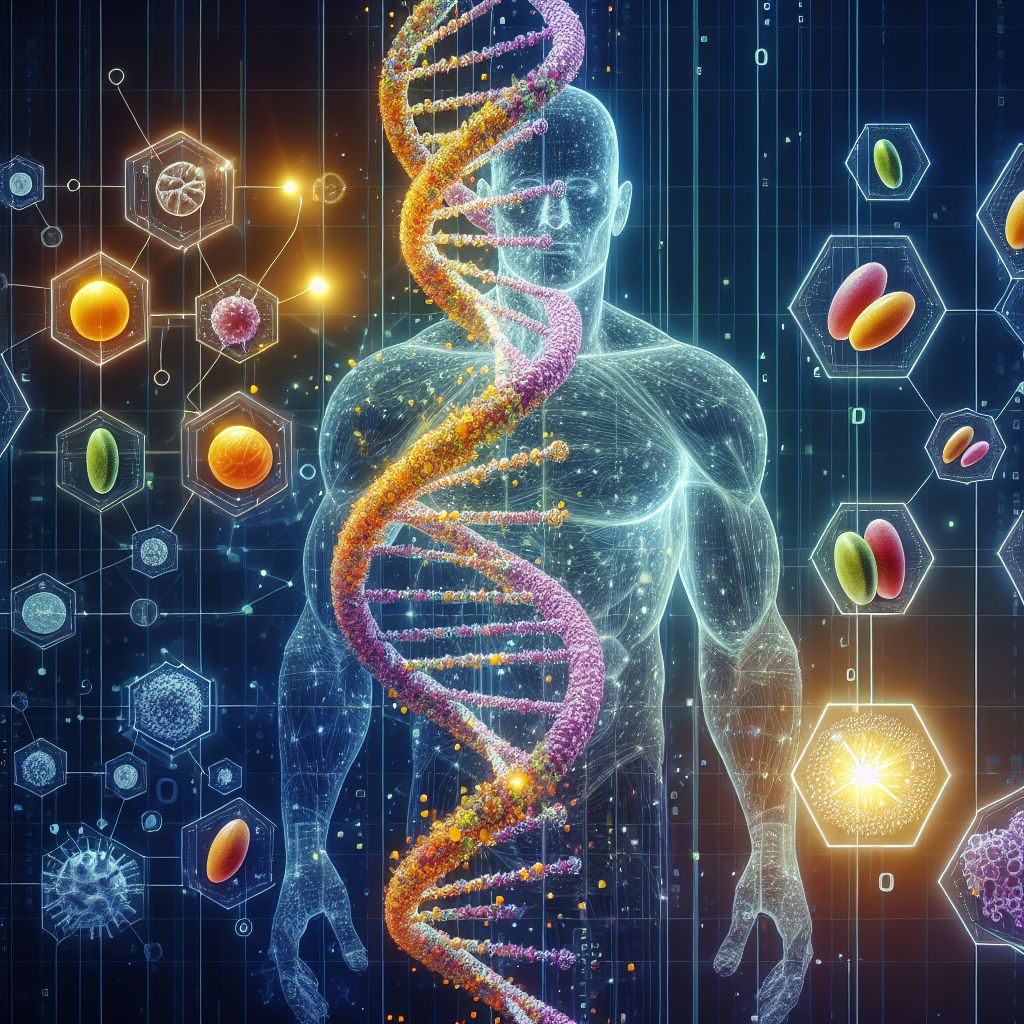Human Design and Vitamins: Personalized Health

Discover your unique Human Design and learn how personalized vitamins can enhance your health. Start your journey towards a healthier you today. Click here to get started.
Exploring the Connection Between Human Design and Vitamin Intake
Human Design, a system that combines astrology, the I Ching, Kabbalah, Hindu-Brahma chakra model, and quantum physics, is increasingly being used to understand individuality and personal health. It provides a blueprint of our unique genetic makeup, offering insights into our strengths, weaknesses, and potential health issues. Recently, there has been a growing interest in the connection between Human Design and vitamin intake, with the belief that understanding one’s design can guide personalized health and nutrition.
The Human Design system categorizes individuals into four types: Manifestors, Generators, Projectors, and Reflectors. Each type has a unique way of interacting with the world and specific nutritional needs. For instance, Manifestors are known for their initiating energy and may benefit from vitamins that support their active lifestyle, such as B-complex vitamins for energy production and muscle recovery. Generators, the powerhouse of the Human Design types, may require a higher intake of vitamins that support their sustained energy output, such as iron and magnesium.
Projectors, on the other hand, are recognized for their ability to guide and manage others. They may benefit from vitamins that support their mental clarity and focus, such as omega-3 fatty acids and vitamin B12. Lastly, Reflectors, who are sensitive to their environment, may require a balanced intake of all vitamins to support their overall well-being.
However, it’s not just the type that influences vitamin needs. The Human Design system also includes Centers, Channels, and Gates, each providing further insights into an individual’s health. For example, an undefined Throat Center may indicate a potential for thyroid issues, suggesting a need for iodine. Similarly, a defined Root Center may indicate a strong adrenal system, suggesting a need for vitamins that support adrenal health, such as vitamin C and B5.
The connection between Human Design and vitamin intake is not a one-size-fits-all approach. It’s about understanding your unique design and using that knowledge to make informed decisions about your health. It’s about personalizing your vitamin intake based on your individual needs, rather than following a generic recommendation.
However, it’s important to note that while Human Design can provide valuable insights into our health, it should not replace professional medical advice. It’s a tool for self-understanding and personal growth, not a diagnostic tool. Always consult with a healthcare professional before making any changes to your diet or vitamin intake.
Moreover, while vitamins are essential for our health, they are just one piece of the puzzle. A balanced diet, regular exercise, adequate sleep, and stress management are equally important for our well-being. It’s about adopting a holistic approach to health, where vitamins are part of a larger health and wellness strategy.
In conclusion, the connection between Human Design and vitamin intake offers a new perspective on personalized health. It encourages us to understand our unique genetic makeup and use that knowledge to optimize our health. It’s a reminder that we are all unique, and our health strategies should reflect that uniqueness. As we continue to explore this connection, we may discover new ways to enhance our health and well-being, paving the way for a more personalized approach to health and nutrition.
Personalized Health: Tailoring Vitamin Regimens Based on Human Design

Human Design, a system that combines astrology, the I Ching, Kabbalah, Hindu-Brahmanic system, and quantum physics, is increasingly being used to guide individuals towards a more personalized approach to health and wellness. This system, which provides a unique blueprint of an individual’s genetic makeup, is now being applied to the field of nutrition, specifically in the tailoring of vitamin regimens.
The concept of personalized health is not new. For years, medical professionals have recognized that a one-size-fits-all approach to health does not work for everyone. People have different genetic makeups, lifestyles, and health needs, which means that what works for one person may not work for another. This is where Human Design comes in. By understanding an individual’s unique design, it becomes possible to create a personalized health plan that caters to their specific needs.
In the context of vitamins, this means identifying which nutrients an individual may need more of, based on their Human Design. For instance, someone with a defined Throat Center, which is associated with communication and expression, may benefit from vitamins that support throat health, such as Vitamin C and E. On the other hand, someone with a defined Spleen Center, which is linked to intuition and survival instincts, may need vitamins that support immune health, such as Vitamin D and Zinc.
Moreover, Human Design can also provide insights into how an individual’s body processes nutrients. For example, those with a defined Solar Plexus Center, which is associated with emotions and desires, may have a more sensitive digestive system. This could mean that they need to take their vitamins with food, or that they may benefit from vitamins in liquid form, which are generally easier to digest.
However, it’s important to note that while Human Design can provide valuable insights, it should not be used as a substitute for professional medical advice. It’s always best to consult with a healthcare provider before starting any new vitamin regimen. They can provide guidance based on a comprehensive understanding of an individual’s health history and current health status.
Furthermore, while vitamins can play a crucial role in supporting health, they are just one piece of the puzzle. A balanced diet, regular exercise, adequate sleep, and stress management are all equally important for maintaining optimal health.
In conclusion, the integration of Human Design into the field of personalized health represents a significant step forward. It offers a new way to understand our bodies and our health, allowing us to make more informed decisions about our wellness. By tailoring vitamin regimens based on Human Design, we can ensure that we are getting the nutrients we need in a way that aligns with our unique genetic makeup. This not only optimizes our health but also empowers us to take control of our wellbeing.
As we continue to explore the potential of Human Design in personalized health, it’s exciting to imagine what other insights we might uncover. Perhaps in the future, we’ll be able to tailor not just our vitamin regimens, but our entire approach to health and wellness, based on our unique Human Design.
The Role of Human Design in Determining Optimal Vitamin Consumption
Human Design, a system that combines astrology, the I Ching, Kabbalah, Hindu-Brahmanic system, and quantum physics, is increasingly being recognized for its potential in personalized health. It offers a unique perspective on individuality, providing a blueprint of our genetic makeup. This blueprint, or BodyGraph, can be used to understand our strengths, weaknesses, and potential health issues. One area where Human Design is particularly insightful is in determining optimal vitamin consumption.
Vitamins are essential nutrients that our bodies need in small amounts to function properly. They play crucial roles in various bodily functions, from boosting the immune system to maintaining healthy skin and eyes. However, not everyone requires the same amount or type of vitamins. Factors such as age, gender, lifestyle, and genetic makeup can significantly influence our vitamin needs. This is where Human Design comes in.
Human Design can provide a detailed map of our genetic makeup, which can be used to tailor a vitamin regimen that best suits our individual needs. For instance, some people may have a genetic predisposition to absorb certain vitamins more efficiently than others. By understanding these genetic variations, we can adjust our vitamin intake accordingly, ensuring that we receive the optimal amount of each vitamin.
Moreover, Human Design can also shed light on potential health issues that we may be predisposed to. For example, if someone has a genetic predisposition to a certain health condition that can be mitigated by a specific vitamin, they can increase their intake of that vitamin to help prevent the onset of the condition. This proactive approach to health can be incredibly beneficial, allowing us to take control of our health and wellbeing.
However, it’s important to note that while Human Design can provide valuable insights into our vitamin needs, it should not be used as a substitute for professional medical advice. Always consult with a healthcare provider before making any significant changes to your diet or vitamin regimen.
Furthermore, while vitamins are essential for our health, they are not a cure-all. A balanced diet, regular exercise, adequate sleep, and a healthy lifestyle are equally, if not more, important for maintaining good health. Vitamins should be used as a supplement to a healthy lifestyle, not as a replacement.
In conclusion, Human Design offers a unique and personalized approach to health. By understanding our genetic makeup, we can tailor our vitamin intake to best suit our individual needs, potentially preventing health issues before they arise. However, it’s important to remember that vitamins are just one piece of the health puzzle. A balanced diet, regular exercise, and a healthy lifestyle are also crucial for maintaining good health. With the help of Human Design, we can take a more proactive and personalized approach to our health, ensuring that we are getting the most out of our vitamins and leading a healthier, happier life.